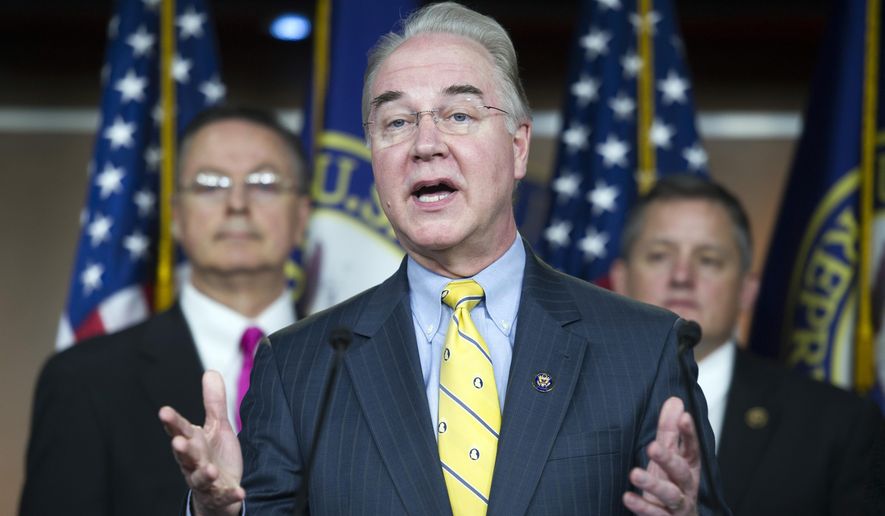House Republicans came together Wednesday to pass a budget that balances within a decade, cutting spending by over $5 trillion, repealing Obamacare and turning Medicare into a voucherlike system along the way.
GOP leaders had to make last-minute changes to boost defense spending in order to keep enough Republicans on board, but ultimately passed the nonbinding plan with room to spare on a 228-199 vote.
The Senate is expected to pass its budget late Thursday or early Friday, and both chambers will then work on a compromise that sets the table for Congress to pass spending bills and other legislation to carry out the blueprint, such as the Obamacare repeal and an overhaul of the tax code.
“We hear the people of this nation crying out, crying out for leadership here in Washington,” said House Budget Chairman Tom Price, Georgia Republican. “This balanced budget for a stronger America will result in a government that is more efficient and more effective and more accountable, one that frees up the American spirit.”
Democrats, though, accused Republicans of “trickle-down economics,” saying the spending cuts will leave the poor and middle class with fewer government services.
“This approach is not a blueprint for growth and opportunity for America’s businesses and workers,” House Minority Whip Steny H. Hoyer, Maryland Democrat, said. “It is, rather sadly, a recipe for economic and fiscal disaster in the years to come.”
The budget’s passage offered a rare bright spot for Speaker John A. Boehner and his deputies after a series of humiliating debacles on the floor, most recently on homeland security funding and immigration, because of rebellions from his right flank.
But it only came after they scrambled to solve a simmering dispute over defense funding, with the Pentagon’s backers insisting the military needs more money. In the end, Mr. Price offered a new version that boosted a war-funding account to $96 billion, allowing a workaround to avoid spending caps that Congress and Mr. Obama agreed to several years ago.
Budget watchdogs called it an embarrassing gimmick but, at least for the short-term, it papered over the fight between defense and deficit hawks.
The White House said the action by House Republicans “made clear that once again, their priority is to cut taxes for millionaires and billionaires and return our economy to the same top-down economics that has failed the American people before.”
“House Republicans voted in favor of locking in draconian sequestration cuts to investments in the middle class like education, job training and manufacturing,” said White House press secretary Josh Earnest. “House Republicans also failed to responsibly fund our national security, opting instead for budget gimmicks.”
Republican leaders hope to rack up a second victory Thursday with passage of a long-sought deal to make the Medicare payment system more predictable for doctors and seniors.
That plan would repeal an 18-year-old budget tool that’s overridden each year with a so-called “doc fix,” even when the formula calls for a cut to physicians’ pay.
Congressional budget scorekeepers said the bipartisan bill will cost $214 billion over the next decade, with about $140 billion tacked onto the deficit, and the rest covered by wealthier Medicare recipients and cuts to providers.
Conservative groups like the Heritage Foundation said the deal added too much debt with uncertain savings down the road, but several GOP lawmakers said it would be more prudent to scrap the formula and avoid annual fixes.
President Obama offered formal support for the Medicare proposal Thursday, which could undercut Senate Democrats who were pressing for a better deal. They wanted to see the Children’s Health Insurance Program authorized for four years instead of two, and some of them dislike language banning community health centers from spending federal funds on abortion.
“I’ve got my pen ready to sign a good bipartisan bill,” Mr. Obama said at a White House event celebrating the fifth birthday of his health overhaul.
Mr. Obama has been less happy with the GOP budget, opposing many of the cuts.
The president’s own plan calls for tax hikes and spending increases — but his budget never reaches balance, leading GOP leaders to deem it unserious.
The House budget checks off familiar items on Republicans’ wish list: encouraging work requirements for welfare recipients, turning Medicaid into a block grant program to empower states to make changes, restoring billions of dollars in Obamacare cuts to Medicare and turning the country’s health insurance for seniors into a voucher-type system beginning in 2024, when the government would use a premium-support model to try to reduce costs and foster more decision-making by the elderly.
While the budget is nonbinding, it creates the chance for Congress to use a process known as “reconciliation,” which allows lawmakers to pass bills carrying out the budget’s instructions without having to face the prospect of a filibuster in the Senate.
Democrats used that tool to help pass Obamacare in 2010, and many Republicans want to use reconciliation to pass a repeal. The legislation would still face an Obama veto, but GOP lawmakers said the showdown is worth it.
“He’s not going to sign it, but we’re going to make the president own what he’s done to this country — destroying the health plans and the doctor-patient relationships of millions of people,” Rep. John Fleming, Louisiana Republican, said.
• Tom Howell Jr. can be reached at thowell@washingtontimes.com.




Please read our comment policy before commenting.